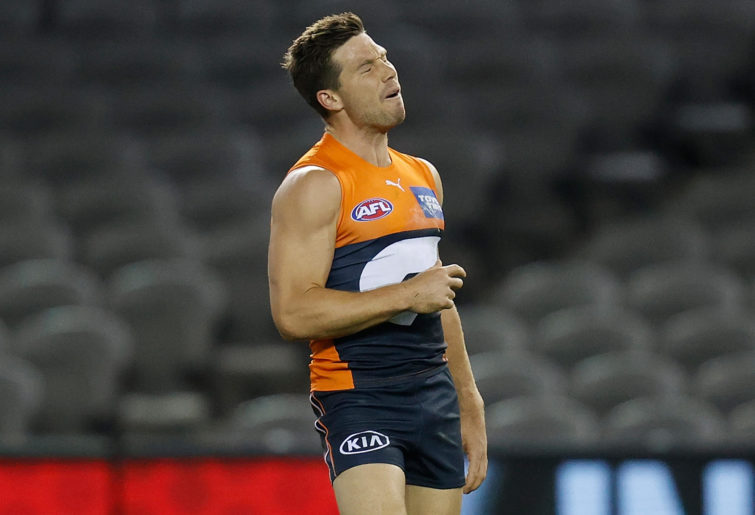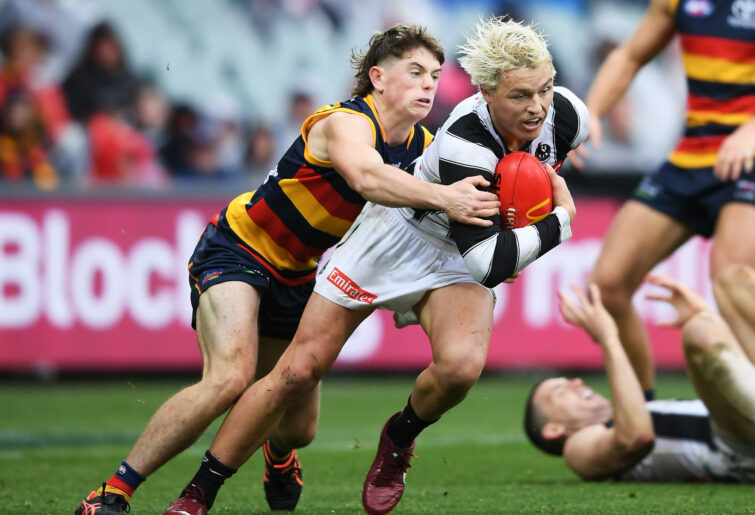
Ginnivan had been subbed out with a hamstring injury. When the coverage crossed to him sitting disconsolately on the bench, the Sydney fans roundly booed him.
Given the Swans had one of their club legends effectively booed out of the game, it’s an astonishing collective choice of behaviour.
I want to write that the bigger surprise is the continued vilification of Ginnivan, but it’s not.
Unfortunately, it’s not at all.
Just look at Sunday’s game – Ginnivan is tackled high, and again the commentators’ narrative is about how he’s accentuated high contact, rather than how it’s simply a legitimate free kick.
Let’s look at some facts.
Does Ginnivan shrug his arm when he feels contact?
Undoubtedly.
Is this ‘cheating’, as some purport?
Any player who is tackled will try break the tackle. That’s logical. Opponent grabs ball-carrier. Ball-carrier tries to break free.
Whatever level we play the game, we’ve all done it. Players will continue to do it long after we’re gone. This is what the game’s about: keeping the ball off the opposition and trying to build an offensive that ends in a score. Naturally, the ball-carrier will do anything they can to break a tackle.
Where is the difficulty in understanding this equation?
Yet Ginnivan critics expect him to remain static and allow the tackler to incapacitate him, and thus win the ball back.
Apparently, an arm shrug isn’t an attempt to shake the tackle, but an effort to drive the tackle high.
If you look at many of the infringements, they occur as Ginnivan is low to the ground and picking up the ball. Does he lower the knees when he feels contact? Occasionally.
So does Joel Selwood. Scott Pendlebury does it. Trent Cotchin does it. Most players do. It’s been going on for years.
And years.

(Photo by Robert Cianflone/Getty Images)
Yet not one of these other players have been vilified. Selwood has been a master at it for over 300 games, but he’s celebrated for his toughness and for finding a way to exploit the rules. The other players aren’t highlighted at all. A league full of perpetrators.
And yet one man – Jack Ginnivan – is castigated as a cheat.
After Mason Redman almost decapitated Ginnivan in the Collingwood-Essendon game, Leigh Matthews emerged in the media with a frustrated but impassioned rant about how much the incident impacted him.
He talked about Ginnivan being umpired to a different set of rules, and how he (Matthews) was sick not to see a free kick given. Matthews even espoused how he’d said (to himself) he’d never again get so emotionally involved in football (after coaching), but this had done it.
Funnily, the social media marauders attacked Matthews. They called him a hypocrite. How could Matthews say anything after striking Geelong’s Neville Bruns behind play all those years ago?
I’m unsure what one thing has to do with the other.
If Matthews had for years championed that he shouldn’t have been penalised in any way for striking Bruns, and was now defending Ginnivan, then you could argue he’s a hypocrite. But he’s doing no such thing.
Matthews striking Bruns has nothing to do with Matthews criticising the game for not protecting Ginnivan and awarding him a free.
Prior to Redman striking and choking Ginnivan, Ross Lyon had already commented on Footy Classified that he was watching opponents tackling Ginnivan with closed fists.
But then after the Redman incident, other football personalities also spoke out.
Leigh Matthews blew up. Gerard Healy agreed with Matthews. On Footy Classified, Eddie McGuire asked Lyon and Matthew Lloyd if the Redman act should’ve been a free, and if Ginnivan was being umpired differently. They concurred.
That’s some esteemed company backing Ginnivan.
Even some media personalities, like Kane Cornes, got on the bandwagon.
Some.
But not all.
The overarching narrative has – as Sunday proved – remained the same.
After the Collingwood-Sydney game, David King tentatively speculated how much the media had played a part in vilifying Ginnivan, but then sheepishly withdrew.
Here’s the simplest reality: every player will attempt to exploit the rules to gain an advantage.
When questioned about the matter on Fox Footy’s On the Couch some weeks ago, Greater Western Sydney’s Toby Greene acknowledged that all the players did it, and it was the responsibility of the tackler to go lower.

(Photo by Michael Willson/AFL Photos via Getty Images)
Leigh Matthews himself said when you’re anticipating contact, you tuck yourself in to brace for impact.
For anybody to expect a ball-carrier who’s being tackled to not shrug, duck, writhe, and do everything possible to break that tackle any way possible, is farcical.
For anybody to condemn Ginnivan, and yet excuse all the other players doing the same thing, is not only hypocritical, but just plain moronic.
The media have played a large part in highlighting Ginnivan’s behaviour, exaggerating it, and then celebrating it as infamy.
But the bigger culprit here is the AFL.
How long did the AFL allow the Essendon supplement scandal to go on, hoping that it would fade into obscurity? It required WADA stepping in independently to handle the situation as it should’ve been handled from the beginning.
How long did the AFL allow Adam Goodes to be booed? Then, years later, they conceded they got it wrong and should’ve acted (much) earlier.
There are plenty of examples.
Now, the game is sensationally denigrating a kid, and they’re silent.
Far be it for me to agree with Eddie McGuire, but he had a point some weeks ago on Footy Classified when he talked about the AFL opening up this grey area.
Was a player taken high? Did they drop the knees? Was it a strike? Was it a tackle? Did he shrug the tackle, and thus effectively and indirectly injure himself? What would the AFL do when players were concussed? When their jaws were broken?
What is right and wrong in a situation so murky and open to interpretation?
McGuire’s nailed it.
The AFL have mishandled this.
It’s fortunate that Ginnivan has something of a mischievous personality – well, that’s what we see as outsiders looking in. He seems to be weathering this as best as he can and continuing to smile publicly.
But how is this truly affecting him? He talked about his mental health struggles. Compare him recently to his exuberance in early rounds. Whatever narrative anybody likes to write, this is affecting him.
I’ve seen people say he’s to blame. Hmmm. So, he’s to blame for opponents winding up and trying to take his head off, as Redman did? For players striking him? For umpires not protecting and rewarding him?
Even if he was “cheating” (as some allege), it doesn’t entitle opponents to knock him senseless. The simpler reality is if infringements are legitimately there, Ginnivan should be protected and rewarded.
No amount of zealously mindless victim-blaming changes that.

(Photo by Mark Brake/Getty Images)
The most laughable thing is what it’s taken (some) media figures to pull back. They bullied Ginnivan, battered him, almost broke him, and then I’m not sure what came next: did they realise they were in the wrong, or did they become afraid they’d be held accountable for their behaviour if Ginnivan withdrew from the game because of mental health concerns?
More importantly, why does it take mental health concerns to change (some) people’s behaviour? So then we have qualified decency? Just kick them and kick them and kick them … until they’re down. And then pull back?
Um, okay.
If I was a parent deciding which sport I wanted my kid to pursue, I know what’d be languishing on the bottom of my list.
How about we just do the right thing from the outset?
How about we don’t create these situations?
As much as I enjoy being pilloried in the comments here and on social media, the reality is undeniable: you have key football people with experience in the arena talking about how wrong all this is.
These are people who made the AFL, who are legends and are experts and have genuine experience, and yet the AFL reward their clamour with silence, and kowtow to the frivolous outrage and despicable sensationalising.
Do I listen to Leigh Matthews, who played in 332 games, seven grand finals, four premierships, and coached a further four premierships across two clubs?
Or the average trolling punter who has three followers on Twitter, or headline-chasing journalist?
Geez, I wonder who might have more credibility?
This game has committed many injustices.
This is just the latest.

Leave a Reply